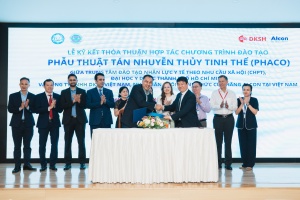INTERNATIONAL INVESTMENT
AND PORTAL
We have observed three key trends in Asia-Pacific, with Vietnam standing out as one of the few regional countries to record on-year foreign direct investment (FDI) growth in healthcare in the first half of 2024, underscoring its pivotal role in the region's future.
 Ankur Pandey, vice president of business unit healthcare at DKSH Vietnam
Ankur Pandey, vice president of business unit healthcare at DKSH Vietnam
Medical tourism is a prime example. It's no longer just about seeking cheaper treatment. It's about finding specialised, quality care. While Thailand and Malaysia have long led the way, Vietnam is quickly building its reputation. We see Vietnam's government support and growing private investment as a sign that the market is ready to capture a greater share of this business, moving from a developing nation to a key regional player.
The second major trend is the medical device boom. This is happening for two main reasons: an ageing population, the number of people over 60 in Asia-Pacific is set to hit 1.3 billion by 2050, and a rise in chronic diseases. This demand is driving the medical devices market in the region, which was valued at $111.93 billion in 2023 and is projected to reach $166.1 billion by 2029. For Vietnam, this means a chance to modernise its healthcare infrastructure, expanding access to care in remote areas.
The final trend is the rise of self-care. Patients are looking for solutions that empower them to manage their own health through digital tools, apps, and over-the-counter products. This is a game-changer for a market like Vietnam, as it can ease the burden on hospitals and doctors, making the entire system more efficient and accessible for everyone.
How is health data and AI healthcare transforming in the region?At DKSH, we see digital health as one of the most powerful forces reshaping how care is delivered and how patients engage with providers across Asia. The global digital health market reached $240.9 billion in 2023 and is set to grow at nearly 22 per cent annually through 2030. Technologies such as telemedicine, AI-driven diagnostics, and cloud platforms are already expanding access, improving accuracy, and driving efficiency across healthcare systems.
Vietnam is advancing rapidly in this transformation. The Ministry of Health's national electronic medical record roadmap is laying the foundation for standardized, interoperable health data. Hospitals are deploying AI and the Internet of Things to optimise patient flows, and forecast medicine demand, helping to reduce overcrowding and strengthen operations.
Equally important, AI is emerging as a game-changer for healthcare supply chains. According to our recent survey on healthcare leaders in Southeast Asian markets, more than 80 per cent of executives in Asia view supply chain as the first area of AI investment, reflecting its potential to predict demand, ensure continuity, and optimise distribution.
Yet technology adoption alone is not enough. From our observation, we continue to see patients across markets voice concerns about privacy, security, and usability. Building trust through transparency, data protection, and user-centric solutions is therefore essential.
What are some of the biggest public health challenges currently facing regional countries?Healthcare systems are undergoing rapid demographic change, and Vietnam is no exception. One of the most pressing challenges is the convergence of population ageing and workforce shortages, which together test the resilience of care delivery.
 DKSH Vietnam invited healthcare partners to a collaborative roundtable discussion on the evolving healthcare landscape
DKSH Vietnam invited healthcare partners to a collaborative roundtable discussion on the evolving healthcare landscape
As one of the fastest-ageing markets in Asia-Pacific, demand for chronic disease management and elderly care in Vietnam is rising sharply. Yet with just 1.11 doctors per 1,000 people in 2021, far below regional peers and well short of the 2050 target of 3.5, the system continues to face capacity pressures, often resulting in overcrowding at central hospitals.
These strains are compounded by financing gaps. Although Vietnam is recognised by the World Bank as one of the region's fastest-growing economies with a rapidly advancing healthcare sector, total health expenditure still accounts for only 5-6 per cent of GDP, below many middle-income peers.
Despite 93 per cent national insurance coverage, public spending represents just 42 per cent of health expenditure, with most of the rest coming from out-of-pocket spending. This creates inequity in access, even as demand accelerates.
However, these challenges also open the door for transformation. The government is taking meaningful steps forward, revising the Law on Health Insurance to expand benefits, decentralising care to strengthen provincial systems, and promoting public-private partnerships to accelerate infrastructure investment.
How do stakeholders like DKSH support the local healthcare sector in dealing with the challenges, as well as partners entering or expanding in Asian markets?As a strategic healthcare solutions partner, DKSH commits to building an ecosystem that connects high-quality international healthcare innovators, trusted local partners and healthcare providers, who share our mission of providing healthcare for all.
By combining global expertise with deep local insights, we design integrated and customized solutions that drive sustainable business growth while ensuring accessible healthcare remains, which enable companies to successfully enter and expand across diverse markets.
Our support begins at the very first step of market entry, from navigating regulatory complexity to building access channels. Beyond operational execution, we provide strategic consultation to clients and partners, ensuring that healthcare solutions delivered to Vietnamese patients are elevated to meet global compliance standards while addressing local needs.
 DKSH Vietnam, Alcon, and the Centre for Health Professionals Training signed a tri-party agreement to continue their 15-year PHACO surgery training partnership
DKSH Vietnam, Alcon, and the Centre for Health Professionals Training signed a tri-party agreement to continue their 15-year PHACO surgery training partnership
Equally important, we contribute to the communities where we operate. We have just celebrated our 15-year partnership with Alcon in a training course for doctors in Vietnam on phacoemulsification techniques, improving surgical outcomes. This initiative is one of many ways DKSH has been contributing to building capacity, empowering healthcare professionals, and promoting care across the region.
In addition, in the upcoming weeks, DKSH organizes the third edition of its Patient Purpose Day, an initiative we organize across multiple markets, including Vietnam, aiming to raise awareness, providing education on key illnesses and diseases, and offering free health checks for targeted communities.
What are DKSH's strategic priorities in Vietnam's healthcare sector over the next 5-10 years?In Vietnam, DKSH's healthcare priorities over the next few years are shaped by one clear ambition: promoting healthcare for all.
We continue to strengthen Vietnam's healthcare ecosystem by fostering deeper partnerships and building an integrated network across the value chain. By working closely with healthcare providers, leaning, and industry stakeholders, we enable international innovators and local partners to expand market access and deliver sustainable healthcare solutions.
At the same time, we invest in our people, empowering teams through digital transformation, capability-building, and a strong culture of compliance and transparency. For DKSH, compliance is more than a regulatory requirement; it is a core value embedded in everything we do. This not only ensures operational excellence but also builds long-term trust with partners and stakeholders.
Ultimately, these efforts converge around what matters most: patients. By enabling our partners, strengthening our people, and maintaining the highest standards of integrity, we commit to better healthcare for all Vietnamese patients in a responsible, sustainable manner and with meaningful impact.
 DKSH Vietnam recognised as top workplace for sixth consecutive year
DKSH Vietnam recognised as top workplace for sixth consecutive year
DKSH Vietnam has once again been recognised among Asia’s best employers, marking its sixth straight win at the HR Asia Awards 2025.
 DKSH to distribute Point Grey products in Vietnam
DKSH to distribute Point Grey products in Vietnam
DKSH Consumer Goods has partnered with Point Grey to bring the Japanese brand’s baby and personal care products to the Vietnamese market, strengthening its presence in Asia.
 DKSH Vietnam renews partnership with Alcon and University of Medicine and Pharmacy
DKSH Vietnam renews partnership with Alcon and University of Medicine and Pharmacy
DKSH Business Unit Healthcare has renewed its strategic partnership with Alcon and the Centre for Health Professionals Training.



















